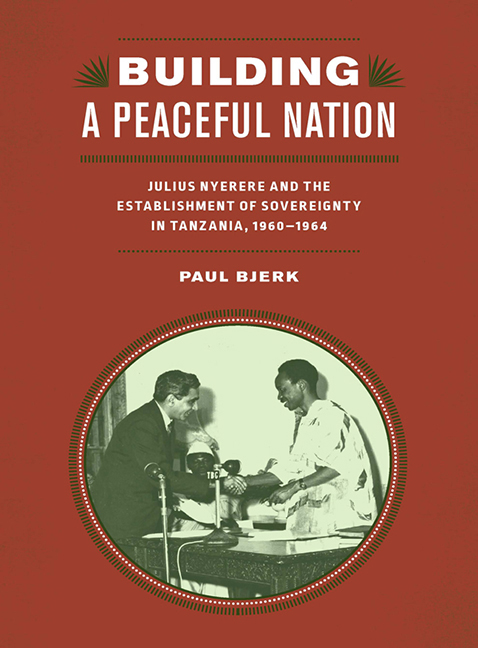 Building a Peaceful Nation
Building a Peaceful Nation 8 - A Realist Foreign Policy
Published online by Cambridge University Press: 08 May 2021
Summary
Among TANU's leaders, a regional vision to safeguard nationalist politics took form even before independence. Nyerere and his colleagues were aware of the internal and external weaknesses of the new state they governed, and they charted a realist course within these limits. Tanganyika's limited military and economic resources, its nonexistent diplomatic corps, and its newly minted statehood made any independent policy goal somewhat improbable, and its leaders were certainly overly optimistic in many regards. Nevertheless, their ideals were meant to stabilize the TANU government and to broadcast its influence abroad, both of which were fundamentally realist policy goals. Their strategy accords with current conceptions of realism that take into account the “multitiered nature of threat assessment.” Rashidi Kawawa recalled an international strategy that was a necessary complement to TANU's domestic goals.
Our commitment was to the liberation of Africa… . This was the commitment of all our citizens. TANU educated all our citizens to make a small contribution to help [neighboring minority-ruled countries]… . If we had left them it would have taken a long time for them to liberate themselves, and our independence would not have been complete… . The shame of being ruled was shared by all of us … so it was necessary to help them to get complete independence.
Tanganyika's early approach sought to use ideological power in concert with its limited diplomatic force in the interest of sovereign autonomy. After the founding of the TPDF in 1964 and the arrival of military aid from China, the newly renamed Tanzania began to exercise significant military force through the liberation movements it supported. However, until the first incursions into Mozambique in September 1964, its influence existed almost entirely in its fluent engagement of diplomatic discourse. The position taken by TANU was that the nation would not be truly free unless neighboring countries were also free, and that a bigger political unit would wield more clout in the international realm. While ideological in its analysis of global political dynamics, it was no less realist in its orientation than the ideologically driven policies of the superpowers.
- Type
- Chapter
- Information
- Building a Peaceful NationJulius Nyerere and the Establishment of Sovereignty in Tanzania, 1960–1964, pp. 183 - 205Publisher: Boydell & BrewerPrint publication year: 2015


